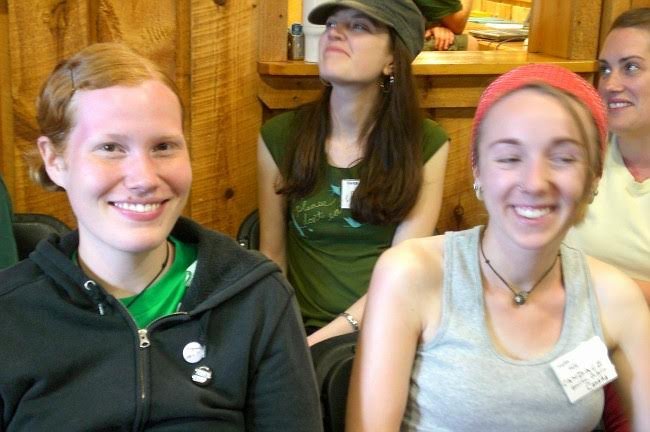A Conversation with OPIRG PIP Alumni
By Valerie Chow
OPIRG’s mission is to empower students and the Hamilton community to take action against social justice and environmental issues. While this can be done as a general volunteer or taking part in a variety of OPIGG’s events, OPIRG encourages students to develop their advocacy skills and activism at the grassroots level through OPIRG’s Public Interest Projects (PIP).
PIPs are student-run projects that have been approved by OPIRG’s Board of Directors to address and tackle specific issues, allowing for positive action against social justice and environmental issues in the public interest. Through these PIPs, students gain access to a variety of resources, such as workshops, funding, tools and equipment, room space, and networking opportunities. OPIRG, while ensuring that the PIPs are independent and autonomous, helps students achieve their goals and support the local and/or global community.
While planning for your PIPs, many criteria need to be considered. First, you need to identify a clear public interest problem and your strategy to achieve impactful outcomes. It is also necessary to determine what goals you hope to achieve with your PIP and how you will gauge your success. However, for students, this may be difficult to understand and have issues writing their project proposal. Here, we have tips and tricks from two different PIPs to assist in your journey to start your own PIP.
Margi Chester founded Hamilton’s Vegetarian Association as an OPIRG working group back in 2005 due to her interest in building community and meeting other like-minded individuals interested in related interests such as environmentalism and sustainability. They held vegan potlucks, conducted panel discussions, and invited speakers to discuss veganism, vegan recipes and diets, and health.
Andrew Loucks was a member of the Global Movement to End the War Against Iraq in the late 1990s and early 2000s. Their purpose was to maintain a connection with the story of an ongoing low-level war of bombing and crippling sanctions, especially the impacts of these policies on Iraqi citizens. They wished to raise awareness on what they saw as an ongoing war against Iraq, whether or not the cameras were capturing it as such, as well as inspire action and change the way the issue was framed. They researched and produced materials about the effects of the ongoing war upon the population, organized a conference of international experts who'd studied and implemented aid programs in Iraq for the UN, and held demonstrations and creative direct actions to challenge the status quo of continued Canadian allyship and participation in a slow, strangling war policy on an entire country.
1. What advantages did you get from running a PIP rather than starting by yourself?
Margi Chester: I had the knowledge and support from OPIRG. Any time I had a question about finding a suitable event space or planning an event, there was a wealth of knowledge and experience from other groups doing the same types of things. The meetings with all the working groups allowed networking and knowledge sharing.
Andrew Loucks: Well, I don't think I would have ever started it by myself. I just couldn't have done that all alone. I think you get a lot of experience and bits of everyday support from OPIRG staff who know Mac and Hamilton as a whole really well. You get a bit of institutional legitimacy and structure with the OPIRG name and how OPIRG operates (consensus decision making, anti-oppression practice), and you probably get a bunch of healthy critiques too from other members, staff, etc. You maybe get your privilege challenged, or your sense of empowerment bolstered. You can gain skills and leadership qualities. You also get to be part of a community of like-minded people. It can be hard to do this work - to put yourself out there, to try things like writing an article or speaking in front of a group, to balance school and the rest of your life with something you're passionate about and compelled to act upon. Being with others can be a good antidote to burnout or discouragement.
2. The PIP application process asks for your goals, plans, measures of success, and more. Did you find the application difficult? How did you approach these questions?
Margi Chester: I made a plan with aspirational goals but then took a second look and tried to make the majority also attainable goals. If you have a fair amount of attainable goals as well as maybe 1-2 aspirational goals, you will feel like you have accomplished something as well as have some things to work towards that may take more than a year of work to achieve.
Andrew Loucks: Well, I didn't have to deal with that process for the Iraq Working Group but I was a member of the OPIRG board for a while and remember that being a bit of a challenging application process for some applicants. I think these questions can be useful for developing a focus and some accountability for the little bit of funding that goes along with projects when approved. I'm old enough to remember when phrases like "Think globally, act locally" came about, which might sound cliche but really can make tangible what you want to do by thinking backwards from a bigger goal that's maybe well beyond little old you. It's like taking that burning desire for something to be different, for some grander change to take shape, but thinking smaller and smaller toward what we can do on the ground where we are today. So some of the PIP application processes might actually help people with those raw desires to make tangible and channel their energy toward specific goals that are important beyond themselves or their immediate experiences. It can help articulate, justify, focus and direct our efforts.
3. How did you plan your PIP? What factors did you consider when creating your strategies and goals?
Margi Chester: I think I answered this in a previous question.
Andrew Loucks: I didn't have to (thankfully!). But I can imagine it would have been wise to consider how many people were interested along with me in starting a project; how much time we had to commit (and being honest and realistic about this); ways to start small; ways to make things fun as well as make a difference; what kinds of things we'd need help with; what kinds of things I don't know and need to find more about; whether those interested in starting the group are those affected by an issue, or compelled to act from a position of relative privilege; how to get more people - and a diversity of people (if that's the goal) involved; what skills exist in the group of people starting things v.s. what skills do we need to learn...
4. Is there anything you would change about your PIP? Such as what your goals are, how you bring attention or contribute to your issues, resources that you would use, etc.
Margi Chester: I would have tried to use campus media to advertise events. I could have done more campus outreach. I mostly relied on cute posters (I think I used a picture with tofu that said “I love tofu” around campus) and selling cute buttons at tables on campus which were both effective strategies, but I definitely could have done more outreach. It was also very effective to collaborate with other groups to put on larger events.
Andrew Loucks: Well, hmmm... I don't know. It might be useful to think of the PIP as a first draft, a beginning, a test that others review to see if it has enough potential to be worthwhile. From there, things can change and evolve. I mean, do your best to have a vision and operationalize it and all that, but don't sweat the beginning too much. Things probably will change and evolve. In hindsight, I think it would have been better to have more people affected by or connected to foreign policy on Iraq involved, and so we may be needed to have a better idea of how to do that and a better effort to do so.
5. What advice would you give people who are undergoing the PIP application process/want to start a PIP?
Margi Chester: Don’t be afraid of putting yourself out there. Just do it and you will learn so much in the process and you will encounter many like-minded people on your journey!
Andrew Loucks: If you care about it; if it moves you or affects you; if you believe it will make a tangible difference beyond you; if you think you can commit a bit of time... just start. Talk to friends and other OPIRG members and staff beforehand. PIPs are about people engaging with issues that matter to them and beyond. Just start engaging and talking with other people. Adapt your ideas when called for, when others offer new information or challenge your assumptions. Don't sweat it if your proposal isn't immediately accepted. Keep at it by being a "long-distance runner" as one OPIRG-sponsored speaker (Staughton Lynd) talked about. The pace of change can be slow but the journey is well worth it.
Beginning a new project can be intimidating, but OPIRG’s PIP gives you access to resources and support that will allow you to make a strong impact on the community. To learn more about PIP’s and view past annual project reports, please visit the OPIRG Website.




